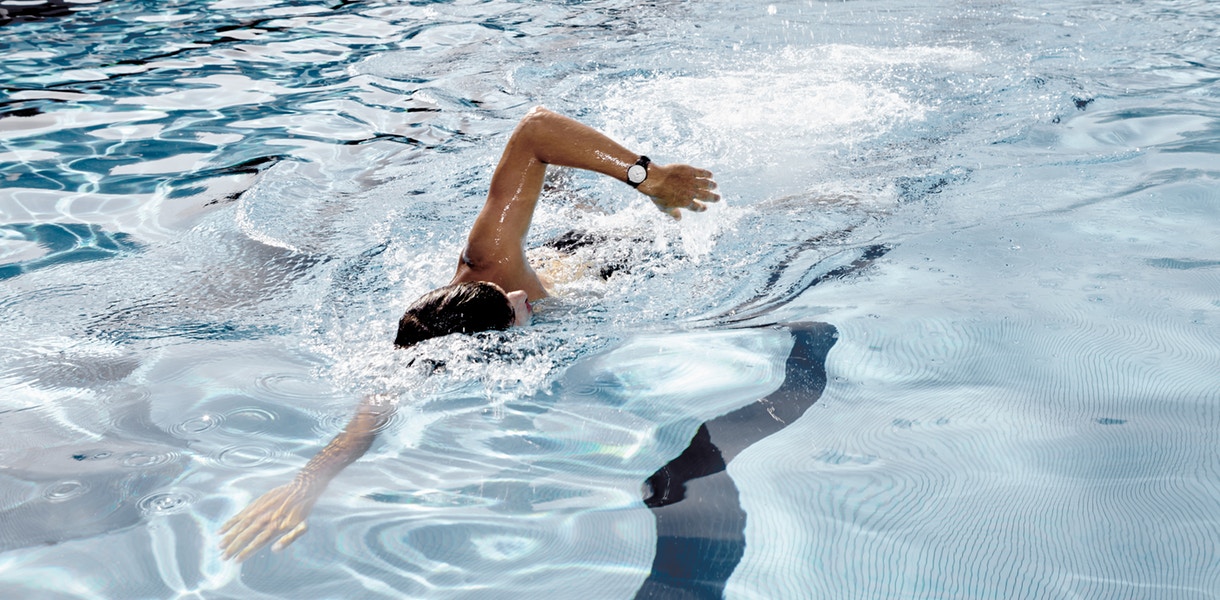
Wondering why swimming is good for you? Find out more about the health benefits, as well as some of the myths and misconceptions surrounding the sport.
It’s a full-body workout
Why is swimming good for you? One of the key reasons is that it’s a total-body workout. Swimming engages your entire body and builds muscle all over, from your torso to your thighs. Each stroke works out a different set of muscles, but no matter which stroke you’re using, the act of pulling your body through the water engages almost all your muscle groups.
It’s a cardiovascular workout
Aside from the vanity aspect—the V-shape swimmer physique with a small waist and broad shoulders is often reported to be one of the most attractive body shapes around—swimming is also a rigorous workout for your cardiovascular system, building strength and endurance, toning muscles, and raising your heart rate without placing extra stress on your body. It also reduces inflammation, boosts lung capacity, improves the strength of your respiratory muscles, and lowers blood pressure.
It rarely causes injuries
While running can have a negative impact on your bones and joints, swimming is completely non-weight-bearing (because the water supports your body weight), giving you the opportunity to work out without stressing your joints. There’s certainly some room for debate when it comes to the debilitating effects of running, but it’s also true that the low-impact nature of swimming makes it much less likely to cause injuries.
It may be suitable for people with certain conditions
Swimming may be a safe and suitable form of exercise for people with certain pre-existing health conditions, including:
- Asthma: The humid environment of the swimming pool may make it a good choice for those with asthma, while the breathing exercises associated with swimming can help to expand lung capacity and give people with asthma more control over their breathing. Former Olympians Adrian Moorhouse and Rebecca Adlington can count themselves amongst the large number of keen swimmers who suffer from asthma.
- Arthritis: As a zero-impact sport, swimming can be great for arthritis sufferers. It stretches your muscles, improves your posture and has a soothing effect on your body.
- Multiple sclerosis (MS): Because swimming keeps your limbs buoyant, it can be beneficial for those suffering from MS.
It’s generally considered safe for pregnant women
Swimming is also a really good way for pregnant women to keep fit. There’s no evidence that chlorine has any negative effects upon your pregnancy, while swimming has been shown to reduce the risk of pre-term births and congenital malformations. Please remember to check with your doctor before you start any form of exercise—especially during pregnancy.
It may improve your sleep
Swimming (like other aerobic exercises) can help people get a good night’s sleep. According to the National Sleep Foundation, exercise has a compelling link to quality of sleep, and intense activities like swimming can even help people to fall asleep faster.
It can help you live longer
According to the Aerobics Center Longitudinal Study, swimming can cut men’s risk of dying by almost 50%, a rate which is significantly higher than running, walking or (unsurprisingly) a sedentary lifestyle. The study was undertaken over a period of 32 years, and even though it was only conducted on men, there’s no real reason why the effects should be any different for women.
Swimming myths debunked
So, we know about some of the health benefits of swimming, but what about those myths masquerading as fact that circulate around the web? Here are the top 3 swimming health myths that need to be debunked.
Myth #1: Swimming makes you taller.
Although people point to the fact that professional swimmers, like professional basketball players, are tall, this doesn’t mean that the act of swimming is an effective way of boosting growth. Professional swimmers are essentially self-selected through their height. Does swimming make you taller? No, it’s correlation, not causation.
Myth #2: You can’t swim in the ocean when you have your period because of the risk of shark attacks.
There’s a bizarre misconception rooted in the idea that sharks are reportedly able to smell blood from miles away. Although their sense of smell is exceptional, it’s not that good. Even if you had a heavy period and expelled all the blood at once, you’d only be losing around 6 tablespoons of blood—hardly enough to raise an eyebrow from the nearby shark population. Menstrual blood (which isn’t exclusively blood, but also contains uterus lining and cervical mucus) isn’t any more attractive to sharks than any other type of blood.
Myth #3: Swimming after eating causes cramps.
One of the most persistent myths around swimming is the idea that you need to wait for about an hour after eating to go for a dip. This is supposedly because the digestive process diverts the circulation of blood away from your muscles. Although this is true, it’s not enough to stop your muscles from performing properly, and there has never been a documented case of drowning because of a full stomach.
So, why is swimming good for you? Put simply, it’s a full-body workout for your muscles and cardiovascular system that’s suitable for pretty much everybody. Now that you’ve got a better sense of the health benefits of swimming, why not head to the pool and take a dip?



